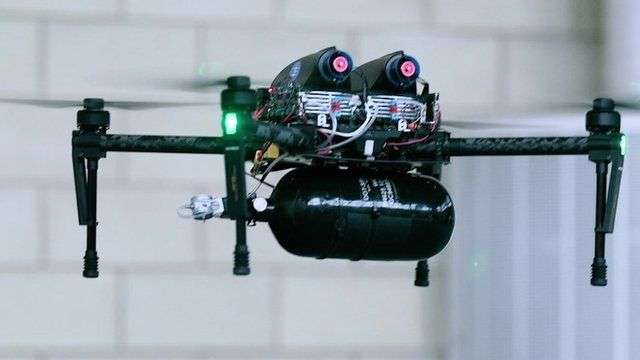March 27, 2016 weblog
Hydrogen-fueled drone taken for test run

A drone aircraft taking off from an airport in Scotland earlier this year for a 10-minute test run at 200 feet and then making a successful landing may not seem like a big deal but the power system on this one has made it newsworthy.
That system was a hydrogen-fueled flight with a gas generator tethered to a fuel cell to create an electrical power supply that was three times lighter than the lithium battery it replaced in the drone.
The Press and Journal had the report, where Phil Anderson, head of marine technology R&D group, Scottish Association for Marine Science (SAMS), said the hydrogen-powered Raptor E1 drone could have flown for two hours with the fuel it had on board. The fuel system is based on hydrogen storage technology from Oxfordshire-based Cella Energy. That technology "addresses issues that surround the potentially hazardous transportation of compressed hydrogen gas," said the report.
SAMS did the UAV test flight using Cella's hydrogen-based power system. If you are wondering what "marine" has to do with all this, Anderson said that, "from methane sampling over tundra to CO2 exchange with the oceans," clean, dependable power in an unmanned aerial vehicle is essential for environmental and climate monitoring.
A report last month from Green Car Congress said, "Cella's material is a solid and is not under compression, is stable in air and at temperatures below 500 ˚C. Because it is a chemical hydride, a chemical process is required to recycle the material; Cella says it is working with chemical industry partners to take the known recycling methods and scale them into a cost-effective industrial process."
As described in The Press and Journal: "The experimental drone, designed and built by Trias Gkikopoulos of manufacturer RaptorUAS, runs on pellets that emit only water vapor when they burn."
"This flight used a small prototype system and we were pleased with the initial flight with another flight scheduled to take place in the near future. The larger versions of this system that we are already designing will have three times the energy of a lithium-ion battery of the same weight," said Stephen Bennington, Cella's managing director.
Alex Sorokin, Cella's CEO, commented that users are in desperate need of a power source that can outperform existing technologies in sectors ranging from emergency services to companies wanting to survey or map their infrastructure, whether a wind turbine or gas pipeline.
Meanwhile, the BBC on Friday said Intelligent Energy's fuel cell can power a modified drone for up to two hours. Intelligent Energy revealed a new drone that is powered by hydrogen fuel cells, and the BBC said the company expects to have the fuel cells ready for commercial use in the next year. The company sees its drones being primarily used in industry for agriculture and oil and gas mapping. Intelligent Energy is a company that focuses on developing modular, low carbon fuel cell systems for partners and their mass markets.
© 2016 Tech Xplore


















